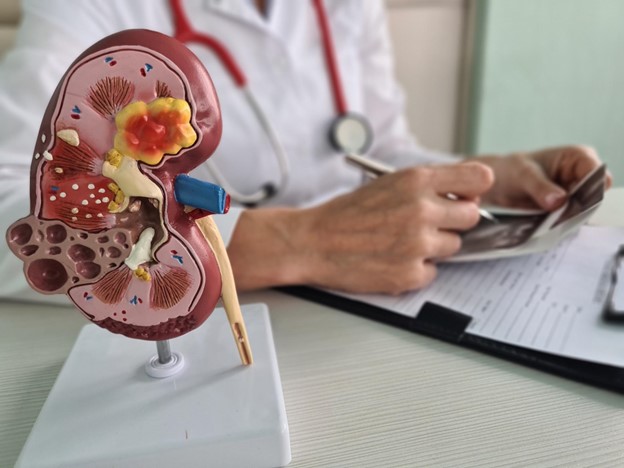Diabetic kidney disease is a serious concern for those with diabetes. Understanding the early signs of diabetic kidney disease can be your first step toward prevention and better management. It’s crucial to identify these indicators as soon as possible because early intervention can make a significant difference in managing the disease effectively.
Understanding Diabetic Kidney Disease: The Vulnerability of Kidneys
Kidneys are essential in filtering waste from our blood. With diabetes, high blood sugar can damage these filters over time, leading to diabetic kidney disease. This happens because high sugar levels cause the kidneys to work harder, and eventually, they may start leaking vital proteins. Regular health check-ups are vital. They can help detect any diabetic kidney disease symptoms early, allowing you to take necessary steps to maintain kidney health. Medical check-ups can alert you to problems before they become severe.
Risk Factors: Who’s More Susceptible?
Various factors can increase the risk of kidney disease and diabetes symptoms worsening. If you’ve had diabetes for a long time, the risk increases. Uncontrolled high blood sugar and high blood pressure also play a role. Family history might make you more vulnerable as well. – Uncontrolled blood sugar: Regular monitoring and adjustments to treatment are crucial. – Hypertension: Keep blood pressure in check to protect your kidneys. – Genetics: Know your family history and discuss it with your doctor. For Indian patients, being mindful of local dietary patterns, like high salt intake, is critical as it can influence the kidneys’ health dramatically.
Common Early Signs of Diabetic Kidney Disease
The first signs of kidney disease in diabetics can be subtle. One of the earliest indicators is finding albumin, a type of protein, in urine. Watch out for urination changes, like increased frequency or darker color. Physical symptoms such as swelling in the feet and ankles, unexpected fatigue, and loss of appetite are also noticeable signs. It’s important to recognize these signs and symptoms of diabetic kidney disease early, to address them with your healthcare provider quickly.
Diagnostic Tests: Catching the Culprit Early
Two common tests help catch kidney disease symptoms diabetes may cause: ACR (Albumin-to-Creatinine Ratio) and eGFR (estimated Glomerular Filtration Rate). These tests measure how well the kidneys are filtering your blood. Regular blood pressure checks also ensure your heart health, as hypertension affects kidney function. Understanding these test results in everyday terms is vital. If you notice diabetic kidney disease symptoms, report them to your doctor right away.
Proactive Lifestyle Choices for Kidney Health
Preventive steps can make a real difference. Keeping blood sugar levels in check is essential for avoiding treatment for diabetic kidney disease later. Engage in regular physical activities and maintain a balanced diet to support your kidneys. If you smoke, consider stopping; it’s hard, but your kidneys will thank you. For people in India, paying attention to sodium intake is especially important given traditional high-salt dishes.
Medical Management Strategies
When it comes to managing the disease, diabetic nephropathy treatment drugs are often recommended. These can significantly slow the progression of kidney disease. Sticking to your medication plan diligently is crucial for effective management. Combining conventional dm nephropathy treatment with locally available integrative treatment options may offer a broader approach to care, providing more personalized care to manage diabetic kidney disease medication needs.
Consistent Monitoring: Taking Charge of Your Health
Regular check-ups with your healthcare provider are essential for keeping an eye on your kidney health. Learning self-monitoring techniques for blood sugar and blood pressure can empower you. Creating a symptom checklist can be helpful when discussing your condition with your doctor. Locally, many clinics and specialists can provide comprehensive care, ensuring you have all the resources necessary to deal with kidney disease symptoms diabetes brings.
Emotional and Mental Health: Navigating the Challenges
Facing a diabetes-related diagnosis can be stressful. However, it’s important to manage anxiety by reaching out to support groups. Sharing experiences within these groups can provide emotional relief. Counseling services, often available in the community, offer professional support.
A Call to Action for Early Intervention
Recognizing early signs of diabetic kidney disease is crucial for timely intervention and preventing progression. Take charge of your health by consulting experts regularly and managing blood sugar levels. At Apollo Chennai, we’re here to guide you in combating misconceptions and maintaining both kidney and overall well-being. Stay informed and proactive—schedule your consultation today!

